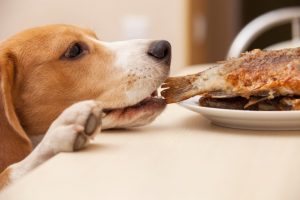Posts Tagged ‘pet preparedness’
The Trouble With Table Scraps
 If the holidays are at your place like it is at our place, it is family, food and football—not necessarily in any order. Unfortunately many pet owners think that holiday time means giving their pets a taste of the tender morsels that they partake in. Before you give table scraps – STOP and think a minute. These high-fat type of foods or foods that your pet is not accustom to can lead to disaster if given to our pets. Just a small amount can lead to pancreatitis in our pets, which can lead to terrible consequences.
If the holidays are at your place like it is at our place, it is family, food and football—not necessarily in any order. Unfortunately many pet owners think that holiday time means giving their pets a taste of the tender morsels that they partake in. Before you give table scraps – STOP and think a minute. These high-fat type of foods or foods that your pet is not accustom to can lead to disaster if given to our pets. Just a small amount can lead to pancreatitis in our pets, which can lead to terrible consequences.
If your pet develops pancreatitis, the treatment focuses on supportive care, such as controlling nausea and vomiting, preventing further dehydration or imbalances in the blood and feeding a low-fat nutritious diet. Serious cases may mean hospitalizing your pet for a few days or longer. Unfortunately, many other diseases have these clinical signs and it makes it a challenge determining if your pet has pancreatitis.
Early diagnosis and treatment is the key to preventing other complications such as dehydration and other systemic diseases.
As your pet ages, he can develop intolerances to certain foods so it may be best to just feed high quality pet foods with little variance and only allow healthy pet treats in moderation.
Most owners know that a only a good quality diet is necessary for their pet, however sometimes good intention visiting guests can complicate things by letting them finish their plate or giving them all of the trimmings off the turkey because they couldn’t resist.
This kind gesture could lead to the previous mentioned consequences.
To avoid pancreatitis a pet owner may take precautions to prevent it. This may include:
- Ask guests to not feed your pet table scraps
- Have healthy treats present if your guests can’t resist
- Keep pets out of the garbage
- Place your pet in a quiet room during mealtime or feed it prior to you and your guests eating
Holidays are all about celebrating and pets are a big part of our family. Kind gestures like feeding table scraps can put a damper on the celebrating if it involves an emergency trip to your veterinarian. So if you set ground rules and make your guests aware of the restrictions for your pets, we can have a safe and happy holiday season.
Olsen Veterinary Clinic is committed to the health and happiness of your pet. For questions, or to schedule an appointment, contact us here.
Tips For Welcoming A New Kitten Into Your Family
 With the holiday rush over, a new resolution may include the family getting a new pet. Are you considering a new kitten? Don’t just jump in and figure it out. A little planning goes a long way. It is not that easy getting a new pet and adjusting the pet to its new environment. It is important to prepare yourselves and your home for your new family member, so I have compiled a list of helpful tips.
With the holiday rush over, a new resolution may include the family getting a new pet. Are you considering a new kitten? Don’t just jump in and figure it out. A little planning goes a long way. It is not that easy getting a new pet and adjusting the pet to its new environment. It is important to prepare yourselves and your home for your new family member, so I have compiled a list of helpful tips.
When choosing your new kitten, it should be a family affair and everyone should be involved in selecting your pet. You may want to spend some time with potential kittens to choose the one that would be the best fit. This would include getting the kitten out of the cage and find an area where you can spend some time with it. Some may be real friendly, however some may be very scared and require some time to warm up to you. This will also give you time to find out as much information as possible about the pet and a glimpse of its personality.
Once you have selected your pet and are taking it home, it is best to purchase a kennel to transport it home in. Remember, this is really stressful time for your new pet and it may be really scared. I recommend placing a towel or pillow in the carrier to make it more comfortable. When you arrive home, it may be best to sit on the floor and let it come to you. Just let it get acquainted on its own terms. If it doesn’t approach, leave it alone and try again later. Ideally, you will want to take it slow with introducing it to other family pets, so you may want to restrict access to them.
Getting your home ready is very important as well. This may include readying a small space like a bathroom for your territorial pet. Cats love small places, so you may want to put a kennel or box so that the kitten may hide. You will want to kitten proof your home by securing drapes or blind cords out of reach and picking up small items that they can possibly ingest. It is important to remove poisonous plants and insect traps and make sure that all cabinets are closed so that they can’t become exposed to harmful household items.
As your pet becomes more adjusted, it may want to explore outside of its safe haven. Make sure that other pets or family members won’t startle it while it expands its territory. The kitten may be ready to play so make sure that you have plenty of toys to keep it entertained.
Cats need to wear their claws down, so it is important to have something that is socially acceptable to scratch on. There are many scratching posts available that will do the trick nicely.
Make sure that it has fresh food and water. Feeding the food that the pet was accustomed to at the shelter will help prevent diarrhea from an abrupt change. When placing the food bowls, make sure they are a good distance from the litter box.
Within a week of bringing your pet home, I would recommend that you schedule an appointment with your veterinarian to make sure that your pet is healthy. Bring all the records that you have so that your veterinarian can make his recommendations.
Congratulations! If you follow these tips, you’ll be on your way to having a well-adjusted family member. By all means, if you have any questions about your pet, please don’t hesitate to contact us. My team and myself would be more than happy to answer your questions.
Do You Have A Pet Preparedness Kit?
 In the last few years, the country has faced many natural disasters like Hurricanes Sandy and Irene, the tornadoes in Missouri and Oklahoma, and the wildfires in the western states. It is important to know that June marks National Pet Preparedness Month as a positive reminder for pet owners to proactively make preparations should they encounter a natural disaster.
In the last few years, the country has faced many natural disasters like Hurricanes Sandy and Irene, the tornadoes in Missouri and Oklahoma, and the wildfires in the western states. It is important to know that June marks National Pet Preparedness Month as a positive reminder for pet owners to proactively make preparations should they encounter a natural disaster.
Many of us consider the pets family so remembering to include your pet in disaster plans can reduce the potential dangers to the pets, their owners, and the first responders. Like humans, pets can become even more stressed or anxious at the onset of a severe weather event, which is why keeping pets calm during the evacuation process is a crucial component. By keeping them calm, this may make the evacuation smoother and reduce the chances of them being left behind or lost during the process.
To insure that your pets are safe during the emergency, it is best to make a plan for their evacuation and also prepare a disaster kit. By doing so, you are protecting the health of not only your pet, but yourself, your family and the first responders.
When making a plan, we must remember that disasters can happen without warning so we must be prepared for these events. This would include:
- Making sure that your pet is wearing a collar and tags with up-to-date information and other identification.
- Making sure that your pet is microchipped and that the microchip is registered in the database.
- Purchasing a carrier for each pet. The pets will be stressed and scared, so this will make transporting a lot easier, and lessen the risk of them getting lost.
- Keep a leash and/or carrier nearby the exit.
- Decide where you and your pet are going to stay.
In the wake of a disaster, the American Humane Associations recommends the following items to be included in a disaster kit. These would include:
- Food (your pet’s regular food)
- Water
- Leash and collar
- Bowls
- Photo of your pet/ID and a photo of you with your pet.
- Your pet’s medications
- Immunization/vet records
- Pet carrier
- First aid kit
- Contact list of pet-friendly hotels, veterinarians, American Red Cross, and out-of town friends or family.
Don’t wait until it is too late. Get started as soon as possible, because we do not know when a natural disaster is going to hit and then it may be too late. If you have any questions, please do not hesitate to contact our office so we can help you protect your furry family member.
